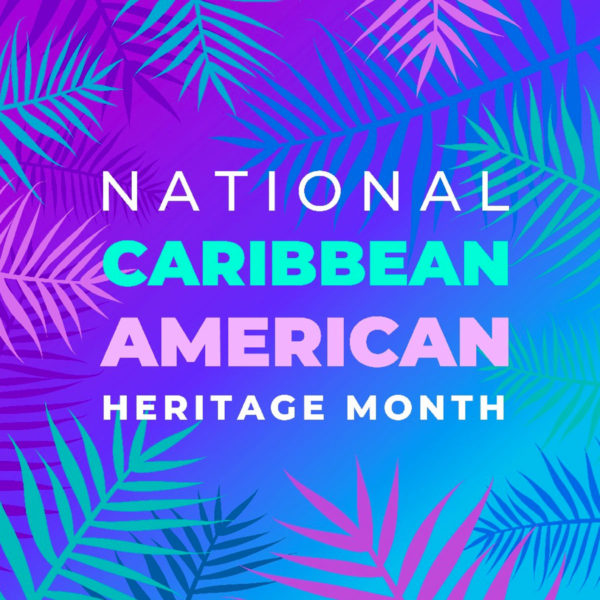Caribbean-American Heritage Month

June is Caribbean-American Heritage month. Over 13.4 million Americans claim Caribbean heritage. The thirteen Caribbean countries are all islands. (Operation World). About 90% of Caribbean-Americans come from five countries: Cuba, the Dominican Republic, Haiti, Jamaica, and Trinidad & Tobago. “Caribbean immigrants have been contributing to the well-being of American society since its founding (Census.gov). Though Caribbean-Americans like Colin Powell, Cicely Tyson, W.E.B Dubois, James Weldon Johnson, Harry Belafonte, and Sidney Poitier have been exalted as trailblazers and heroes, there are millions of people who have not yet made the history books but have added to the significant fiber of this country.
As I write this, I think of Langston Hughes’s poem “I, Too.” (Spacey) The first words of the poem, “I, too, sing America” resonates with me because a vast gap in representation exits. To ensure the vibrancy of this growing African diasporic community, it would serve us well to guide learning about the geography, culture, music, food, and daily life of Caribbean-Americans within our homes and classroom spaces. As we make lesson plans and create culturally relevant prepared environments for summer programs and/or the 2022-2023 school year, it is a great time to pay homage to those who identify as Caribbean-Americans beyond thirty days. I offer a few suggestions.
Expand the musical genres and styles that we offer children. Amplify what we hear. Select a day throughout the week to routinely explore varying types of music, including Caribbean instruments and rhythms. Dialogue about all aspects of the music, musicians, artists, and embarking on research to learn more about the universal language of song are great follow-up activities.
Foods, cooking practices, and celebration are an aspect of one’s culture that brings history to everyday life. When we talk about the Caribbean- American experience and food, it is valuable to include the African diaspora–the mass dispersion during the transatlantic slave trades from the 1500s through the 1800s of African people. Those enslaved Africans brought with them the knowledge of herbs, spices, and cooking techniques that created cultural distinctions that still influence many Americans today. Imagine how different vegetables, spices and herbs can be included in food preparation, expanding a school garden, and researching the health benefits and cultural rituals that include these indigenous ingredients.
Another way to continue the celebration is to is to highlight books, artwork, or images that you are offering your students. During Caribbean-American Heritage Month and beyond, we are challenged to intentionally center humanity over accomplishments. This means we are moving at a slower pace as we learn more through conversations, art, books, and documentaries. It could also mean we are extending our imagination beyond highlighting culture primarily through curated booklists. As guides to the children in our lives, we want to create as Dr. Rudine Bishop Sims would say, “mirrors, windows, and sliding glass doors.” We want to create “mirrors” – a situation in which people of the global majority are represented as citizens that constantly relive historical references that depict tragedy. Children should see themselves, and those of their communities, as people living full lives. “Windows” allow the reader to imagine and visualize the lives of someone else. Lastly “sliding doors”— give the children an opportunity to step into the world created by the author (Reading is Fundamental).
With our work, we are constantly bringing in, as well as expanding, the child’s world by showing the common thread we all hold, our personhood. In closing, I give thanks for the work we are engaged in together and I am encouraged by the work that is left to be done.
Our Guest writer is Ashley Causey-Golden. She is the creator of Afrocentric Montessori and co-founder of Gather Forest School in Atlanta, Georgia. Her work is grounded in a liberatory, anti-bias and anti-racist framework that centers Blackness. Ashley holds a Bachelor of Science, Elementary Education and Learning Disabilities and Emotional and Behavioral Disabilities from Winthrop University, Rock Hill, SC and a Master of Arts, Sociology, and Education from Columbia University’s Teachers College, New York, NY.
Citations
National Caribbean-American Heritage Month. (2022, June). Retrieved from: https://www.census.gov/newsroom/stories/caribbean-american-heritage-month.html on June 9, 2022
Reading is Fundamental. (2022, January). Retrieved from: https://scenicregional.org/wp-content/uploads/2017/08/Mirrors-Windows-and-Sliding-Glass-Doors.pdf on June 9, 2022
Spacey, Andrew. Analysis of Poem “I, Too” by Langston Hughes. (2020, January). Retrieved from: https://owlcation.com/humanities/Analysis-of-Poem-I-Too-by-Langston-Hughes on June 9, 2022
Caribbean Countries 2022 (2022). Retrieved from https://worldpopulationreview.com/country-rankings/caribbean-countries on June 9, 2022
